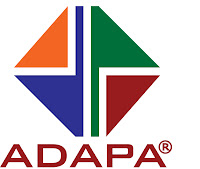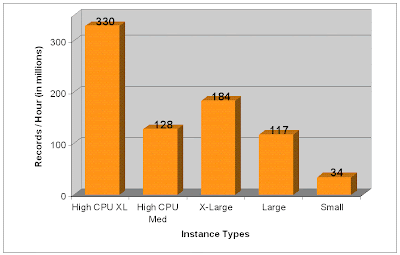
Cloud computing promises lower cost and higher scalability. Translating this to a real-world practical application for predictive analytics, here is what this means for you in simple facts and numbers. With the
Zementis ADAPA scoring engine on the Amazon Elastic Compute Cloud, you can
score over 300 million (!) records for about $3, all in less than one hour.
Performance and scalability have been key design principles for ADAPA, in addition to open standards and Service Oriented Architecture (SOA). To illustrate this in a real-world benchmark, we measured the batch scoring performance for different Amazon EC2 instance types. Because computational efforts vary across different model types, we report only the average numbers measured for a collection of ten (10) different predictive models, each based on processing a data file containing 10 million records.
 Figure: Average number of records processed per hour for each Amazon EC2 instance type. The average is based on 10 different PMML models, with the fastest instance scoring over 300 million records per hour.
Figure: Average number of records processed per hour for each Amazon EC2 instance type. The average is based on 10 different PMML models, with the fastest instance scoring over 300 million records per hour.
We used ten different predictive models, including various regression models, neural network, clustering and decision tree …

Cloud computing promises lower cost and higher scalability. Translating this to a real-world practical application for predictive analytics, here is what this means for you in simple facts and numbers. With the
Zementis ADAPA scoring engine on the Amazon Elastic Compute Cloud, you can
score over 300 million (!) records for about $3, all in less than one hour.
Performance and scalability have been key design principles for ADAPA, in addition to open standards and Service Oriented Architecture (SOA). To illustrate this in a real-world benchmark, we measured the batch scoring performance for different Amazon EC2 instance types. Because computational efforts vary across different model types, we report only the average numbers measured for a collection of ten (10) different predictive models, each based on processing a data file containing 10 million records.
 Figure: Average number of records processed per hour for each Amazon EC2 instance type. The average is based on 10 different PMML models, with the fastest instance scoring over 300 million records per hour.
Figure: Average number of records processed per hour for each Amazon EC2 instance type. The average is based on 10 different PMML models, with the fastest instance scoring over 300 million records per hour.
We used ten different predictive models, including various regression models, neural network, clustering and decision tree algorithms which were created in several statistical tools and then exported in the Predictive Model Markup Language (PMML) standard. The PMML models subsequently were deployed and executed in the ADAPA Predictive Analytics Edition on Amazon EC2.
The fastest instance (Amazon type High-CPU XL), ADAPA scored on average over 300 million records in one hour. One hour of the High-CPU XL instance costs US$2.49 (two dollars and forty nine cents), plus a few cents for the data transfer; all in all, it adds up to less than $3 for the task.
In addition to raw processing performance for scoring data, note that ADAPA remarkable accelerates the speed of deployment and integration for predictive analytics. While it is possible to scale processing speed with additional hardware, deployment and integration are the real bottlenecks for projects. Only a framework that leverages open standards for interoperability provides the necessary agility required for proper management and deployment of predictive models.
With cloud computing and Software as a Service (SaaS), ADAPA delivers an unprecedented cost/performance ratio for implementing predictive analytics across the enterprise.
Sign up for ADAPA on Amazon EC2 instantly and start using it in just a few minutes! Starting at $1 per hour for a small instance and no long-term commitment required, experience for yourself what ADAPA does for your predictive models without breaking the bank. Use your own models or try ADAPA with our
PMML model examples.
Comprehensive blog featuring topics related to predictive analytics with an emphasis on open standards, Predictive Model Markup Language (PMML), cloud computing, as well as the deployment and integration of predictive models in any business process.
Link to original post
 Cloud computing promises lower cost and higher scalability. Translating this to a real-world practical application for predictive analytics, here is what this means for you in simple facts and numbers. With the Zementis ADAPA scoring engine on the Amazon Elastic Compute Cloud, you can score over 300 million (!) records for about $3, all in less than one hour.
Cloud computing promises lower cost and higher scalability. Translating this to a real-world practical application for predictive analytics, here is what this means for you in simple facts and numbers. With the Zementis ADAPA scoring engine on the Amazon Elastic Compute Cloud, you can score over 300 million (!) records for about $3, all in less than one hour.Figure: Average number of records processed per hour for each Amazon EC2 instance type. The average is based on 10 different PMML models, with the fastest instance scoring over 300 million records per hour.
 Cloud computing promises lower cost and higher scalability. Translating this to a real-world practical application for predictive analytics, here is what this means for you in simple facts and numbers. With the Zementis ADAPA scoring engine on the Amazon Elastic Compute Cloud, you can score over 300 million (!) records for about $3, all in less than one hour.
Cloud computing promises lower cost and higher scalability. Translating this to a real-world practical application for predictive analytics, here is what this means for you in simple facts and numbers. With the Zementis ADAPA scoring engine on the Amazon Elastic Compute Cloud, you can score over 300 million (!) records for about $3, all in less than one hour.Figure: Average number of records processed per hour for each Amazon EC2 instance type. The average is based on 10 different PMML models, with the fastest instance scoring over 300 million records per hour.





